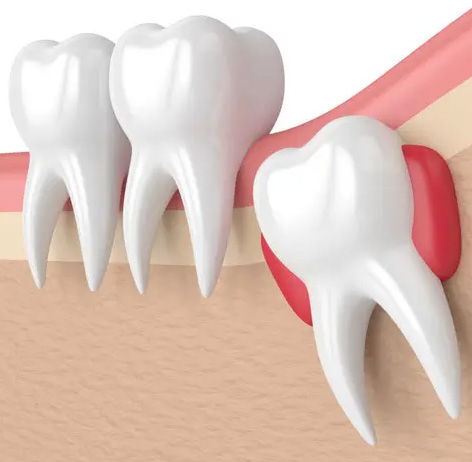Full Wisdom Teeth Removal in Hamilton
Your wisdom teeth are the last molars on each side of the lower and upper jaws and are usually the last set to grow in the mouth. Most people don’t feel them coming in until they’re in their late teens or early twenties. Normally, these molars can erupt through the gum line without causing problems.
For some, however, the development of these teeth come with complications. At Century Stone Dental, we offer wisdom teeth removal in Hamilton to avoid any potential complications that can arise when your back teeth erupt.
How Are Wisdom Teeth Removed?
Regular trips to the dentist will allow them to monitor the progress of tooth development from an early age, until adulthood. The dentist will be able to evaluate your molars and recommend removal if their development will cause complications in the mouth.
Wisdom tooth removal can be a fairly simple procedure, or a bit more complicated depending on the reason for removal. For instance, a severely impacted tooth will involve a more surgical procedure than a minor one.
Typically all of the molars are removed at the same time during your visit to the dentist, versus removing them individually. This reduces the need for repeat surgery and recovery times.
It is important to note that proper dental hygiene and care is important for the health of all of your teeth at all times. If you're brushing and flossing regularly, you're more likely to spot symptoms of trouble with your wisdom teeth early and report it to the dentist.
On the other hand, regular visits will allow the dentist to spot complications early on and monitor tooth growth. When your molars are removed, you should be diligent with oral care to avoid infections and complications.
WISDOM TEETH REMOVAL: SIGNS AND COMPLICATIONS
The back of the mouth is often much more crowded, leaving a narrow space for the teeth to erupt. When a wisdom tooth doesn't have enough room to come in, it's considered impacted. The tooth may become twisted, lean to the side or become displaced as it struggles to emerge from the gum line. If you have had braces in the past, it is a good idea to get your molars removed before they move other teeth around to make room for growing in.
There are different degrees of impaction, from minimal to severe. Below are the most common types of impactions:
- Soft tissue impaction occurs when the wisdom tooth emerges from the jawbone, but never erupts through the gum line
- Partial impaction occurs when the wisdom tooth only partially erupts from the gum line
- Complete bony impaction occurs when the wisdom tooth is encased in the jaw bone and never emerges

Crowding:
If crowding occurs, your dentist may recommend wisdom tooth extraction for preventative purposes so you don’t develop complications with your teeth later.
Signs of Infection:
- Inflammation of the gum over and around the impacted tooth
- Pain in the gum line, jaw or temples
- Bleeding gums
- Fever and chills
- Swollen lymph nodes
- Jaw stiffness or trouble completely opening the mouth
Pericoronitis:
People often experience a bad taste in the mouth that won’t go away with brushing, mouthwash or using breath fresheners. They may also have bad breath or notice discharge from the area around the affected tooth.
If you develop any of these symptoms, consult your dentist or doctor right away. Antibiotics are sometimes required to cure pericoronitis.
Contact Us for Wisdom Tooth Removal In Hamilton
Call us at 905-545-4833 or email us at info@centurystonedental.com and book an appointment.
SPEAK TO YOUR DENTIST ABOUT THIS PROCEDURE TODAY!
At Century Stone Dental, we are happy to answer any questions you may have about this procedure. Call our office to book an appointment for one of our services today. Call at 905-545-4833 or email us at info@centurystonedental.com

